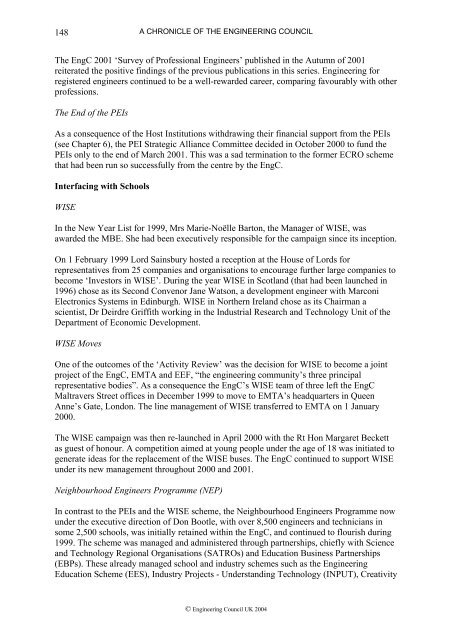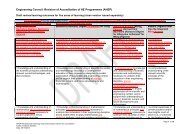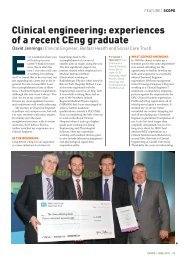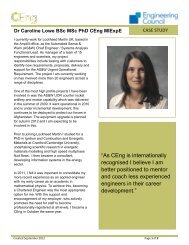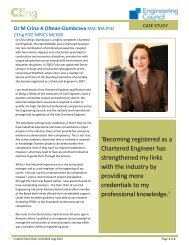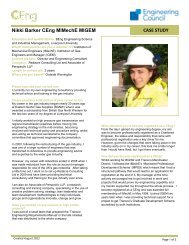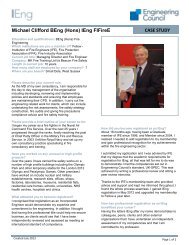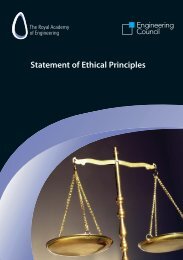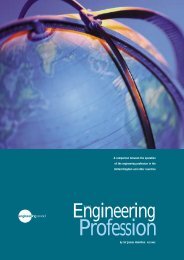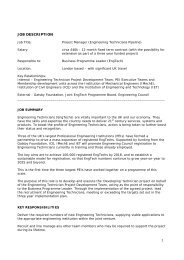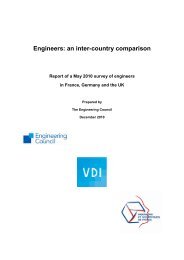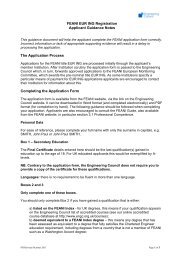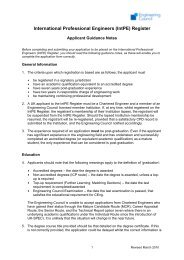An Engine for Change - A Chronicle of the Engineering Council
An Engine for Change - A Chronicle of the Engineering Council
An Engine for Change - A Chronicle of the Engineering Council
Create successful ePaper yourself
Turn your PDF publications into a flip-book with our unique Google optimized e-Paper software.
148A CHRONICLE OF THE ENGINEERING COUNCILThe EngC 2001 ‘Survey <strong>of</strong> Pr<strong>of</strong>essional <strong>Engine</strong>ers’ published in <strong>the</strong> Autumn <strong>of</strong> 2001reiterated <strong>the</strong> positive findings <strong>of</strong> <strong>the</strong> previous publications in this series. <strong>Engine</strong>ering <strong>for</strong>registered engineers continued to be a well-rewarded career, comparing favourably with o<strong>the</strong>rpr<strong>of</strong>essions.The End <strong>of</strong> <strong>the</strong> PEIsAs a consequence <strong>of</strong> <strong>the</strong> Host Institutions withdrawing <strong>the</strong>ir financial support from <strong>the</strong> PEIs(see Chapter 6), <strong>the</strong> PEI Strategic Alliance Committee decided in October 2000 to fund <strong>the</strong>PEIs only to <strong>the</strong> end <strong>of</strong> March 2001. This was a sad termination to <strong>the</strong> <strong>for</strong>mer ECRO schemethat had been run so successfully from <strong>the</strong> centre by <strong>the</strong> EngC.Interfacing with SchoolsWISEIn <strong>the</strong> New Year List <strong>for</strong> 1999, Mrs Marie-Noëlle Barton, <strong>the</strong> Manager <strong>of</strong> WISE, wasawarded <strong>the</strong> MBE. She had been executively responsible <strong>for</strong> <strong>the</strong> campaign since its inception.On 1 February 1999 Lord Sainsbury hosted a reception at <strong>the</strong> House <strong>of</strong> Lords <strong>for</strong>representatives from 25 companies and organisations to encourage fur<strong>the</strong>r large companies tobecome ‘Investors in WISE’. During <strong>the</strong> year WISE in Scotland (that had been launched in1996) chose as its Second Convenor Jane Watson, a development engineer with MarconiElectronics Systems in Edinburgh. WISE in Nor<strong>the</strong>rn Ireland chose as its Chairman ascientist, Dr Deirdre Griffith working in <strong>the</strong> Industrial Research and Technology Unit <strong>of</strong> <strong>the</strong>Department <strong>of</strong> Economic Development.WISE MovesOne <strong>of</strong> <strong>the</strong> outcomes <strong>of</strong> <strong>the</strong> ‘Activity Review’ was <strong>the</strong> decision <strong>for</strong> WISE to become a jointproject <strong>of</strong> <strong>the</strong> EngC, EMTA and EEF, “<strong>the</strong> engineering community’s three principalrepresentative bodies”. As a consequence <strong>the</strong> EngC’s WISE team <strong>of</strong> three left <strong>the</strong> EngCMaltravers Street <strong>of</strong>fices in December 1999 to move to EMTA’s headquarters in Queen<strong>An</strong>ne’s Gate, London. The line management <strong>of</strong> WISE transferred to EMTA on 1 January2000.The WISE campaign was <strong>the</strong>n re-launched in April 2000 with <strong>the</strong> Rt Hon Margaret Beckettas guest <strong>of</strong> honour. A competition aimed at young people under <strong>the</strong> age <strong>of</strong> 18 was initiated togenerate ideas <strong>for</strong> <strong>the</strong> replacement <strong>of</strong> <strong>the</strong> WISE buses. The EngC continued to support WISEunder its new management throughout 2000 and 2001.Neighbourhood <strong>Engine</strong>ers Programme (NEP)In contrast to <strong>the</strong> PEIs and <strong>the</strong> WISE scheme, <strong>the</strong> Neighbourhood <strong>Engine</strong>ers Programme nowunder <strong>the</strong> executive direction <strong>of</strong> Don Bootle, with over 8,500 engineers and technicians insome 2,500 schools, was initially retained within <strong>the</strong> EngC, and continued to flourish during1999. The scheme was managed and administered through partnerships, chiefly with Scienceand Technology Regional Organisations (SATROs) and Education Business Partnerships(EBPs). These already managed school and industry schemes such as <strong>the</strong> <strong>Engine</strong>eringEducation Scheme (EES), Industry Projects - Understanding Technology (INPUT), Creativity© <strong>Engine</strong>ering <strong>Council</strong> UK 2004


